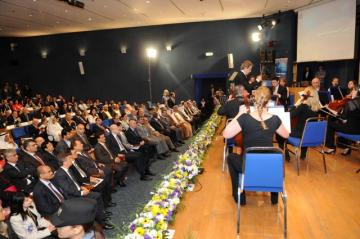
The 27th Ministerial Session of the Economic and Social Commission for Western Asia (ESCWA) opened on 9 May at the United Nations House in Beirut. Speakers at the opening ceremony were Mr. Saleh Al-Kharabsheh, Secretary-General of the Ministry of Planning and International Cooperation in Jordan, which chaired the 26th Session of the Commission, Mr. Sultan Bin Said Al-Mansoori, Minister of Economy in the United Arab Emirates chairing the current Session, Ms. Rima Khalaf, Under-Secretary-General of the United Nations and Executive Secretary of ESCWA, and Mr. Najib Mikati, Prime Minister of Lebanon. Mr. Derek Plumbly, the UN Special Coordinator for Lebanon delivered a message by the United Nations Secretary-General addressed to the Session.
Mr. Al-Kharabsheh stressed the importance of general policy issues in the ESCWA region that were to be discussed during the Session such as “The Role of Participation and Social Justice in Achieving Sustainable and Balanced Development, Inclusive Finance in the ESCWA Region: Current Status and Future Prospects, and Preparations for Rio+20 in the Region,” which are of main concern to all citizens in the Arab World, forming the basis of what is happening in the region. The Jordanian official thanked the Commission for producing a regional profile on Rio+20 preparations and expected outcomes, which were concluded in a series of preparatory meetings previously held in Cairo.
For his part, Mr. Al-Mansoori commended ESCWA’s role in establishing regional integration, in increasing the pace of coordination, in consolidating partnerships, in reinforcing the principle of transparency and effective communication among the peoples of the region, and in contributing to the formulation and development of policies and legislation. He added that the Session is a fundamental verse to reinforce regional cooperation “because nobody can work alone and away from others.”
Delivering the message of Secretary-General Ban Ki-moon, Mr. Plumbly said: “I commend ESCWA’s decision to focus this session on the correlation between social justice and sustainable development as a contribution to preparations for the United Nations Conference on Sustainable Development next month in Rio de Janeiro. Rio+20 is a generational opportunity to take bold action to address the interrelated problems of poverty, environmental degradation, scarcity of natural resources and related threats. We need comprehensive solutions that cut across these linked challenges. For example, more efficient energy sources can spur economic growth, protect the environment and spread the benefits of development. I count on ESCWA to help us connect the dots and chart a path to the future we want.”
In her statement, Ms. Khalaf said: “The opportunities and challenges that confront us today are many, but they differ considerably from those that we spoke about during the twenty-sixth session. At that time, we were concerned about the crisis raging in the world’s financial centres, which quickly became a debilitating economic crisis… Today, we witness a different spectacle. Today, it is our region that is producing the newspaper headlines, and it is others who fear the consequences… Like earthquakes, these regional and global changes are shifting the very ground beneath our feet. We must implement reforms and development efforts expeditiously to keep up with these changes and to protect our economies and the well-being that is our peoples’ right.”
On the other hand, Mr. Miqati said: “Lebanon supports the requests of Tunisia, Morocco and Libya to join ESCWA. It confirms the regional countries’ confidence in ESCWA and their commitment to regional integration.” He added: “We are here today at a time where Arab countries are witnessing drastic changes which put it on a historic crossroad to which we should respond by achieving development through reform, rejuvenation, and democracy. We are in front of a phase full of hope, yet, it is full of difficult choices and dangers. Therefore, we are in need of all social factions, especially the youth, the governments, and civil society institutions, who should work together to improve our economies within a new development paradigm, for a future full of freedom, dignity and human rights.”
The 27th Ministerial Session of ESCWA will conclude its meetings on Thursday 10 May 2012 with discussions on inclusive finance in Western Asia and a launching ceremony to promote the Commission’s Cyber Legislation Directives.





